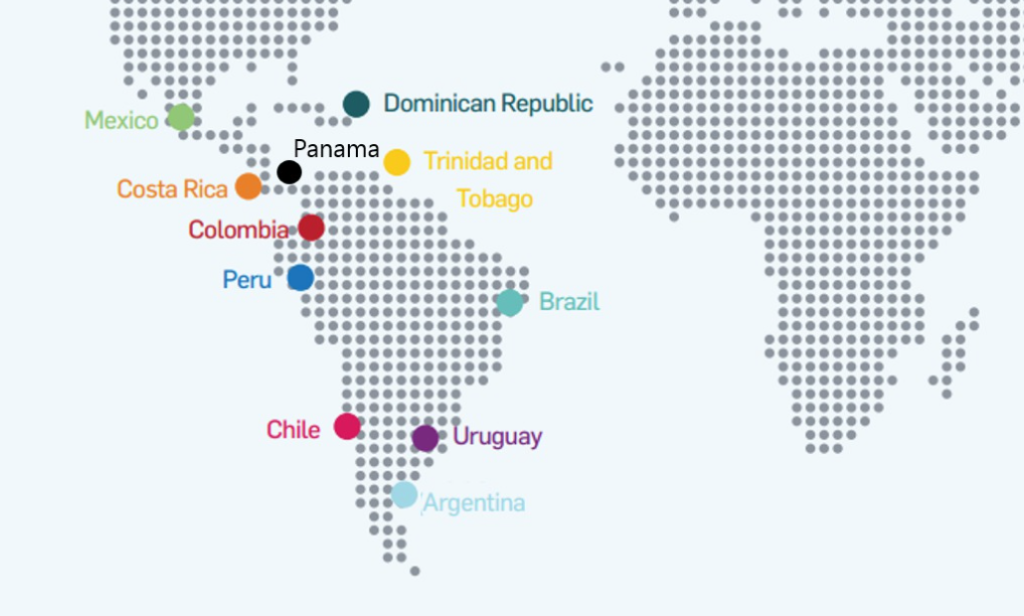Manage Your Business
How to Hire Software Developer in Latin America for your Tech Startup
Are you a tech startup on the hunt for the perfect software developer?
South America is quickly becoming an attractive destination for tech startups looking to get that competitive edge in their industry. In this blog, we’ll discuss how to legally hire a software developer in South America, so you can make sure you have the right person on board to help your business succeed.
Let’s get started!
Over 1 million software developers can be found in Latin America.
Starting a new tech business often involves hiring employees from other countries. We can call it latam offshoring. If you wish to hire a software developer from South America, there are a number of legal considerations you should take into account. Knowing the relevant local laws and regulations in the country you plan to hire from, and understanding the associated compliance requirements, will help ensure that your hiring process is efficient and compliant with applicable laws.
Developing a solid understanding of all applicable regulations relating to international employment in Central and South America will help ensure that your company is able to successfully hire individuals while avoiding penalties or fines. In this article, we examine some of the key considerations involved in legally hiring software developers from South America for a tech startup:
But before going overseas, learn more about the peculiarities of offshore software development in Latin America.
Understanding the Legal Requirements
Before hiring a software developer in Central and South America, it is important to understand what is required for the successful compliance of all legal requirements. The regulations and laws vary from country to country, and so do the visa rules.

To hire a Latam software developer abroad, you must first obtain either a work permit or a contract of employment. Depending on your company structure and the type of work the software developer will be doing, this will dictate which option is best for you.
You should also research the legal requirements on how long your employee can actually stay in the country before they must return home – again influenced by their visa rules and contractual limits between you as an employer and them as an employee.
It is important to note that when hiring software developers abroad, your team may need to retain IT experts to ensure that any digital information they collect while abroad complies with both local privacy laws as well as those of your home country. This data protection task should be part of all job offers made to potential foreign nationals abroad.
As an employer, you are also responsible for ensuring that your foreign employees have appropriate working conditions and access to essential workplace rights such as workplace health benefits – all based on local labor laws in each respective location where you plan on hiring someone from abroad.
Finally, companies should research any specific international tax obligations they may have when hiring software workers in South America or other countries around the world. All these steps are particularly important not only ensuring that their operation abides by laws but also protecting its reputation – due diligence on these issues can’t be overlooked if wanting to conduct business successfully in new regions like South America for tech startups!
3 Benefits of Hiring a Software Developer in South America
When considering the global technology landscape, South America provides a unique opportunity for entrepreneurs and mid-market businesses seeking to hire software developers. In addition to providing access to world-class tech talent, there are a variety of advantages to hiring software developers from South American countries.
- Cost of labour is much more competitive in many South American markets compared to North America or Europe. This enables startups and mid-market companies an increase in their budget for other expenses or operations – such as marketing, research or product development – or even help save money that can be reinvested elsewhere.
- As many South American countries are part of smaller global economies, their governments have taken measures to encourage startups and innovation by offering attractive tax incentives for foreign investors. This can help reduce the cost of labor even further and ensure that tech companies get a fair market rate for the work they seek from contract workers and remote employees.
- Lastly, establishing solid interpersonal connections with people from different regions can go a long way in helping create meaningful bonds with potential customers and suppliers when launching technologies internationally. When reaching across borders it is important that companies develop understanding about cultural differences as well as regulatory frameworks in order to effectively navigate this new environment and make successful partnerships in this new global economy.
Where to Find Qualified Software Developers in Latin America?
When it comes to finding the right software developer for your startup, you may be wondering how and where to go about obtaining the necessary legal information for successful hiring in South America. There are several resources available that can provide a comprehensive view of the legal requirements necessary for acquiring qualified software developers in this region.
To start, many venture capital firms and accelerators which operate in South America are knowledgeable of local recruiting laws that regulate hiring contractors, either full-time or freelance. They can help you understand the legal implications associated with hiring software developers and make sure that your new hires will comply with all applicable regulations before they begin work with your startup.
Furthermore, if you have an established network of programmers and tech professionals or have used online job boards previously to advertise positions, then there are some specific steps you should take to ensure a smooth transition into choosing new developers from South American countries.
For example, since foreign talent has different rules than domestic employees regarding work visa eligibility requirements and taxes imposed, researching whether candidates have appropriate qualifications is essential. Additionally, having a contract set up outlining details such as terms of service, payment model (e.g., hourly rate or project-based wage), job description/project scope and timeline expectations is also vitally important when trying to bring on software developers from this region.
Overall, networking with other tech startups and keeping abreast of global changes to legal policies pertaining to foreign labor practices is one way entrepreneurs can maximize their chances at finding qualified software developers from South America for their tech startup. Doing thorough research on individual compliance issues beforehand is another key step entrepreneurs can take when seeking out highly skilled employees from overseas locations like South America for successful contracting solutions going forward.
How to Vet Potential Candidates?
When searching for a software developer for your tech startup, it’s important to take the time to vet potential candidates. In South America, there are numerous resources available to help you make sure you’re hiring the right person. Depending on your business’s individual needs and goals, candidates should be able to demonstrate their programming skills, demonstrate ethical standards associated with software development and possess a solid understanding of the business’s mission and values.
To ensure that the best qualifications possible are present in each potential hire, use the following suggestions:
- Request coding abilities be assessed through evaluation tests or past projects.
- Require potential hires provide references who can verify their professionalism and ability to problem-solve when coding challenges arise.
- Ask them about compliance measures – Core web development applications such as JavaScript/AJAX must comply with various international laws such as GDPR (General Data Protection Regulation). If a developer is not familiar with existing regulations, it is advisable to avoid them as non-compliance will become an issue at some point in the future.
- Ask questions about security measures – A secure code should have no major vulnerabilities due customer data standard encryption protocols are followed such as AES (Advanced Encryption Algorithm). Basic security frameworks must also be followed such OWASP (Open Web Application Security Project).
- Compare quotes from different providers – Fees vary depending on several factors including experience level and company reputation so you want to get several quotes before making a decision. The lowest quote may not necessarily mean poor quality – read every assessment report properly and compare it with others before optimizing your code budget according to market trends in South America.
- Assess cultural compatibility of each candidate – Work culture is an important factor when crafting successful teams in any region, South America included – analyze how well aligned long term interests align between your company goals and those of each candidate you interview while balancing overall project objectives alongside candidate fitment into existing teams prior or after hire date.
Negotiating Terms and Agreements
Before you start negotiations, it’s important to understand the specific labor laws and regulations in Central and South America. Many countries in South America have individual laws governing the options available for hiring a software developer, including immigration regulations and visa requirements. It is also important to take into consideration cultural factors that may influence negotiations and agreement terms.
Once you have a good understanding of your legal responsibilities as an employer, you can begin to negotiate terms and agreements with potential software developers. Consider key points such as:
- the salary or hourly rate offered,
- duration of employment,
- benefits packages,
- rights to ownership of intellectual property produced during or related to the employment agreement etc.
Prepare a comprehensive outline that includes all relevant details so that your developer understands exactly what is expected from them before signing an agreement.
When possible, it may be beneficial for both parties involved to consult with legal professionals for additional guidance throughout the process. A qualified lawyer can help ensure that all necessary steps are taken before both sides agree upon a contract and signing it off for legal ratification. This will help ensure that all parties are fully aware of their respective rights and obligations throughout the business arrangement, making sure everyone involved is fairly treated in compliance with applicable regulations.
Tips for Working with Software Developers in Central and South America
Before beginning the hiring process, it is important to understand the restrictions on foreign employees in South America. In some countries, visas and permits may be required for foreign employees working with technology companies. It is also important to understand the wages and labor policies of each country you are looking to hire from, as wage costs may vary significantly from region to region.
- Understanding technical skills, background, and experience requirements for the software developer position
- Providing a detailed job description before interviewing candidates
- Asking questions about past projects and experiences, technology companies or startups in South America
- Checking for skills in software development environments like AngularJS or JavaScript
- Inquiring about specific methods used to resolve coding issues
- Identifying suitable candidates for employment in tech startup
- Negotiating salary and benefits through HR representatives
- Considering non-wage incentives such as company car schemes in South America
- Discussing relevant labor laws before entering contract discussions
- Sending official offer letters and signed contracts once terms are agreed upon.
Ultimately, hiring qualified software developers in South America requires research and knowledge regarding labor laws but provides access to an excellent pool of well-trained professionals who can help grow any tech startup venture.
101: Why do you need Latam coders?
In conclusion, hiring the right software developer for your tech startup in Central and South America (Mexico, Brasil, Argentina or Colombia) is an important decision that can have lasting implications for the success of your business.
Legally hiring a software developer can be a complex process that involves investigating local laws in the country where they will be based and understanding their legal rights as workers.
-

 Cyber Risk Management3 days ago
Cyber Risk Management3 days agoHow Much Does a Hosting Server Cost Per User for an App?
-

 Outsourcing Development3 days ago
Outsourcing Development3 days agoAll you need to know about Offshore Staff Augmentation
-

 Software Development3 days ago
Software Development3 days agoThings to consider before starting a Retail Software Development
-

 Grow Your Business3 days ago
Grow Your Business3 days agoThe Average Size of Home Office: A Perfect Workspace
-
Solution Review3 days ago
Top 10 Best Fake ID Websites [OnlyFake?]
-
Business Imprint3 days ago
How Gaming Technologies are Transforming the Entertainment Industry
-

 Gaming Technologies1 day ago
Gaming Technologies1 day agoHow to Set Up Text-to-Speech for Channel Points on Twitch












